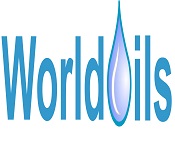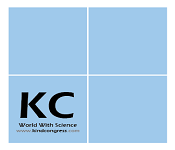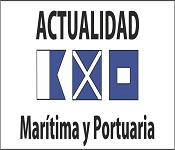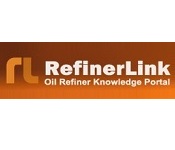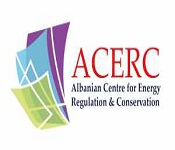Theme: Straddling the gap between miles & milestone
Petroleum Processing 2018
Conference Series LLC Ltd seeks your gracious presence at this colossal congregation of the world of Chemical Sciences at the “World Congress on Petroleum Processing, Petrochemistry and Geology’’ during November 09-10, 2018, at Birmingham, Alabama, USA. Petroleum Processing 2018 is being organized with the theme of: Straddling the gap between miles & milestone.
Petroleum Processing 2018 assures its attendees of a platform, perfect for the exchange and sharing of invaluable knowledge, research findings and experiences that can happen with clarity as that of a crystal. Basics-new & old, emerging technologies, their “know-hows” and their impact on the present scenario of the Petroleum industries are some of the few knowledges that can be noted under the “to-be-gained-in-conference” list. Explore & Experience the words and beyond the lines from the notable speakers’ presentations, exhibition desks and posters-all related to the minutes of the concerned fields of the colloquium.
The conference is going to include prompt Keynote presentations, Oral talks, Poster presentations, Workshops, Symposiums and Exhibitions.
Petroleum refineries generally converts much of the barrel of crude oil into transportation fuels which is economically practical. Refineries produce many profitable products such as the transportation fuel gasoline, turbine (jet) fuels, diesel and the light heating oils. These are counted as the high-volume profitable products of refineries. Petroleum refining begins with distillation or fractionation of crude oils into separate hydrocarbon groups. The characteristics of the crude oil reflects in the resultant product. Most of the distillation products are further converted into useful products by changing the size and structure of the hydrocarbon molecules through cracking, reforming and other conversion processes.
Crude oils are basically classified as naphthenic, paraffinic or aromatic based on the predominant proportion of similar hydrocarbons. Mixed - base crudes have varying amounts of each type of hydrocarbon. Refinery crude base stocks consist mixtures of two or more different crude oils.
Conferences are some of best times to meet and get inspired by scientists & inventors globally. Hope, you will also take the advantage of this conference and make the best out of it.
Why Birmingham:
Birmingham (/ˈbÉœËrmɪŋhæm/ BUR-Ming-ham) is the most populous city in the U.S. state of Alabama and the county seat of Jefferson County. The city's population was 212,237 in the 2010 United States Census. In the 2010 US Census, the Birmingham-Hoover Metropolitan Statistical Area had a population of about 1,128,047, which is approximately one-quarter of Alabama's population.
From its founding through the end of the 1960s, Birmingham was a primary industrial centre of the southern United States. Its growth from 1881 through 1920 earned its nicknames as The Magic City and The Pittsburgh of the South. Its major industries were iron and steel production, plus a major component of the railroading industry. Rails and railroad cars were both manufactured in Birmingham. Since the 1860s, the two primary hubs of railroading in the Deep South have been nearby Atlanta and Birmingham. The economy diversified in the latter half of the 20th century. Banking, telecommunications, transportation, electrical power transmission, medical care, college education, and insurance have become major economic activities. Birmingham ranks as one of the largest banking centres in the United States and as one of the most important business centres in the Southeast.
In higher education, Birmingham has been the location of the University of Alabama School Of Medicine (formerly the Medical College of Alabama) and the University Of Alabama School Of Dentistry since 1947. Since that time it has also gained the University of Alabama at Birmingham (founded circa 1969), one of three main campuses of the University of Alabama System. It is also home to three private institutions: Stamford University, Birmingham-Southern College, and Miles College. In total, the Birmingham area has major colleges of medicine, dentistry, optometry, physical therapy, pharmacy, law, engineering, and nursing. The city has three of the state's five law schools: Cumberland School of Law, Birmingham School of Law, and Miles Law School. Birmingham is also the headquarters of the South-western Athletic Conference, and South-eastern Conference, one of the major U.S. collegiate athletic conferences.
Conference Series LLC Ltd conference invites all the participants across the globe to attend “World Congress on Petroleum Processing, Petrochemistry and Geology” during November 09-10, 2018, at Alabama, USA. Petroleum Processing 2018 that includes prompt keynote Speaker, presentations, oral talks, poster presentations and exhibition.
Theme of Petroleum Processing 2018 conference is “Straddling the gap between miles & milestone" with an objective to encourage young minds and their research abilities by providing an opportunity to meet the experts in the field of Engineering. Petroleum Processing events are designed to explore various applications in different fields.
Conference series LLC Ltd organizes a conference series of 3000+ Global Events with over 600+ Conferences, 1200+ Symposiums and 1200+ Workshops in USA, Europe & Asia with support from 1000 more scientific societies and publishes 700+ Open access journals which contains over 30000 eminent personalities, reputed scientists as editorial board members.
Petroleum Processing 2018 Tracks Content:
Track 1: Geology and Environmental Sustainability
Environmental geology combines the core foundation of environmental science and places particular emphasis on the study of geology and applying it to real-world situations. It is an applied science concerned with the practical application of the principles of geology in the solving of environmental problems. It includes Hydrogeology, Environmental Mineralogy, Hydro geochemistry, Soil Mechanics and so on. The fundamentals concepts of environmental geology are Human population growth, Sustainability, Earth as a system, Hazardous earth processes etc. Environmental Geology involves geologic hazards, natural resources, and topical issues of concern to society such as climate change and provides sound advice about how humanity can live responsibly and sustainably on Earth.
Research on environmental geology emphases on the physical and chemical processes occurring at or near the Earth’s surface impacting by human activities. Hydrogeology is important now a days as some parts of the world are blessed with frequent rainfall and plentiful surface water resources, but most countries need to use the water that is stored underground to supplement their needs. Environmental geology applies geologic information to the solution, prediction and study of geologic problems such as Earth materials, Natural hazards, Landscape evaluation, Environmental impact analysis and remediation.
Petroleum Processing Conferences | USA Petroleum Conferences | Petroleum Processing Conferences USA:
World Congress on Petroleum Processing, Petrochemistry and Geology| Alabama| USA| November 09-10, 2018; 10th International Conference & Expo on Reservoir Engineering for Extreme Oil & Gas Environments| Buenos Aires| Argentina| Oct 31-Nov 1, 2018; 10th Asia Pacific Congress on Oil and Gas| Shanghai| China| September 10-11, 2018; 9th Annual Congress and Expo on Biofuels and Bioenergy| Dubai| UAE| April 16-17, 2018; 8th International Conference on Petroleum Engineering| Rome| Italy| May 17-18, 2018; 3rd World Congress on Petroleum Engineering and Natural Gas Recovery Sydney| Australia| July 20-21, 2018.
Track 2: Crude Oil Excavation
Foul or unrefined oil generally called as "Dark Gold". Crude oil is a naturally occurring mineral oil which is composed of hydrocarbon deposits and other organic materials. Crude oil can be further refined into usable products such as gasoline, diesel and various forms of petrochemicals. Crude oils are basically classified as naphthenic, paraffinic or aromatic based on the predominant proportion of similar hydrocarbons. Oil and Gas are hydrocarbons as they are the compounds of carbon and hydrogen particles. By increasing the temperature, common matter first gets changed into lamp fuel, which is a solid kind of hydrocarbon. At around 90°C, it changes into a liquid state, which is oil and at around 150°C, it changes into a gas. A stone that has made oil and gas is known as a Source Rock.
Petroleum Processing Conferences | USA Petroleum Conferences | Petroleum Processing Conferences USA:
11th World Congress on Petrochemistry and Chemical Engineering| Alabama| USA| November 09-10, 2018; 10th International Conference & Expo on Reservoir Engineering for Extreme Oil & Gas Environments| Buenos Aires| Argentina| Oct 31-Nov 1, 2018; 10th Asia Pacific Congress on Oil and Gas| Shanghai| China| September 10-11, 2018; 9th Annual Congress and Expo on Biofuels and Bioenergy| Dubai| UAE| April 16-17, 2018; 8th International Conference on Petroleum Engineering| Rome| Italy| May 17-18, 2018; 3rd World Congress on Petroleum Engineering and Natural Gas Recovery Sydney| Australia| July 20-21, 2018.
Track 3: Reservoir Engineering
Reservoir Engineering In the oil and gas engineering industry, reservoir modelling involves the construction of a computer model of a petroleum reservoir, for the purposes of improving estimation of reserves and making decisions regarding the development of the field. A reservoir model represents the physical space of the reservoir by an array of discrete cells, delineated by a grid which may be regular or irregular. The array of cells is usually three-dimensional, although 1D and 2D models are sometimes used. Values for attributes such as porosity, permeability and water quality are associated with each cell. The value of each attribute is implicitly deemed to apply uniformly throughout the volume of the reservoir represented by the cell.
Petroleum Processing Conferences | USA Petroleum Conferences | Petroleum Processing Conferences USA:
World Congress on Petroleum Processing, Petrochemistry and Geology| Alabama| USA| November 09-10, 2018; 10th International Conference & Expo on Reservoir Engineering for Extreme Oil & Gas Environments| Buenos Aires| Argentina| Oct 31-Nov 1, 2018; 10th Asia Pacific Congress on Oil and Gas| Shanghai| China| September 10-11, 2018; 9th Annual Congress and Expo on Biofuels and Bioenergy| Dubai| UAE| April 16-17, 2018; 8th International Conference on Petroleum Engineering| Rome| Italy| May 17-18, 2018; 3rd World Congress on Petroleum Engineering and Natural Gas Recovery Sydney| Australia| July 20-21, 2018.
Track 4: Hydro treating and Hydrocracking
Hydrotreating is a refinery process for reducing sulphur, nitrogen and aromatics while enhancing cetane number, density and smoke point. Hydrocracking is a catalytic chemical process used in petroleum refineries for converting the high-boiling constituent hydrocarbons in petroleum crude oils to more valuable lower-boiling products such as gasoline, kerosene, jet fuel and diesel oil. In modern petroleum refineries Hydrotreaters are the most commonly processed unit. The world’s hydrotreating capacity is nearly half as large as the world’s crude distillation capacity. There are more than 1300 hydrotreating units in more than 700 refineries around the globe. Atypical Western petroleum refinery uses at least three hydrotreaters– one for naphtha, one or two for light gas oil, and one or two for heavy gasoil and/or vacuum gas oil
Hydrotreating is more common than hydrocracking, but the number of partial-conversion in hydrocrackers is increasing as refiners build new units to meet clean fuel regulations.
Both hydrotreating and hydrocracking uses high-pressure hydrogen to catalytically remove contaminants from petroleum fractions. Both achieve at least some conversion, and they use the same kinds of hardware.
Petroleum Processing Conferences | USA Petroleum Conferences | Petroleum Processing Conferences USA:
World Congress on Petroleum Processing, Petrochemistry and Geology| Alabama| USA| November 09-10, 2018; 10th International Conference & Expo on Reservoir Engineering for Extreme Oil & Gas Environments| Buenos Aires| Argentina| Oct 31-Nov 1, 2018; 10th Asia Pacific Congress on Oil and Gas| Shanghai| China| September 10-11, 2018; 9th Annual Congress and Expo on Biofuels and Bioenergy| Dubai| UAE| April 16-17, 2018; 8th International Conference on Petroleum Engineering| Rome| Italy| May 17-18, 2018; 3rd World Congress on Petroleum Engineering and Natural Gas Recovery Sydney| Australia| July 20-21, 2018.
Track 5: Oil and Gas Management
Oil and gas are naturally occurring chemicals that are made up of just two elements Hydrogen and Carbon. Nowadays Oil and Natural gas reserves are found in many parts of the world. In the past, demand was low, and reserves were not so easy to find. In fact, the first users of oil depended on surface oil excretion for their supplies. However, as demand increased all usable oils are easily found. Today oil exploration takes place in some of the most challenging places on earth. Now all are surveying for new oil reserves thousands of feet under the ocean and lands.
Petroleum Processing Conferences | USA Petroleum Conferences | Petroleum Processing Conferences USA:
World Congress on Petroleum Processing, Petrochemistry and Geology| Alabama| USA| November 09-10, 2018; 10th International Conference & Expo on Reservoir Engineering for Extreme Oil & Gas Environments| Buenos Aires| Argentina| Oct 31-Nov 1, 2018; 10th Asia Pacific Congress on Oil and Gas| Shanghai| China| September 10-11, 2018; 9th Annual Congress and Expo on Biofuels and Bioenergy| Dubai| UAE| April 16-17, 2018; 8th International Conference on Petroleum Engineering| Rome| Italy| May 17-18, 2018; 3rd World Congress on Petroleum Engineering and Natural Gas Recovery Sydney| Australia| July 20-21, 2018.
Track 6: Oceanography
Oceanology is the study of the physical and biological aspects of the ocean. It is an Earth science covering a wide range of topics, including ecosystem dynamics; ocean currents, waves, and geophysical fluid dynamics; plate tectonics and the geology of the sea floor; and fluxes of various chemical substances and physical properties within the ocean and across its boundaries. These diverse topics reflect multiple disciplines that oceanographers blend to further knowledge of the World Ocean and understanding of processes within: astronomy, biology, chemistry, climatology, geography, geology, hydrology, meteorology and physics. Pale oceanography studies the history of the oceans in the geologic past.
Petroleum Processing Conferences | USA Petroleum Conferences | Petroleum Processing Conferences USA:
World Congress on Petroleum Processing, Petrochemistry and Geology| Alabama| USA| November 09-10, 2018; 10th International Conference & Expo on Reservoir Engineering for Extreme Oil & Gas Environments| Buenos Aires| Argentina| Oct 31-Nov 1, 2018; 10th Asia Pacific Congress on Oil and Gas| Shanghai| China| September 10-11, 2018; 9th Annual Congress and Expo on Biofuels and Bioenergy| Dubai| UAE| April 16-17, 2018; 8th International Conference on Petroleum Engineering| Rome| Italy| May 17-18, 2018; 3rd World Congress on Petroleum Engineering and Natural Gas Recovery Sydney| Australia| July 20-21, 2018.
Track 7: Pipeline and Storage
Pipelines carries flammable or explosive material such as natural gas or oil. Usually oil pipelines are buried and it’s made from carbon steel or plastic tubes. The oil is moved through the pipelines by pump station. Natural gas is lightly pressurised into liquids known as Natural Gas Liquids (NGLs). Natural gas pipelines are made up of carbon steel.
Today Companies use oil storage as a strategic tool to increase profits in the global market. Companies can purchase oil to low price and wait until prices rise before selling. A 'contango' is a condition in the oil market where it is expected that people will be willing to pay more in the future than at the current price.
Petroleum Processing Conferences | USA Petroleum Conferences | Petroleum Processing Conferences USA:
World Congress on Petroleum Processing, Petrochemistry and Geology| Alabama| USA| November 09-10, 2018; 10th International Conference & Expo on Reservoir Engineering for Extreme Oil & Gas Environments| Buenos Aires| Argentina| Oct 31-Nov 1, 2018; 10th Asia Pacific Congress on Oil and Gas| Shanghai| China| September 10-11, 2018; 9th Annual Congress and Expo on Biofuels and Bioenergy| Dubai| UAE| April 16-17, 2018; 8th International Conference on Petroleum Engineering| Rome| Italy| May 17-18, 2018; 3rd World Congress on Petroleum Engineering and Natural Gas Recovery Sydney| Australia| July 20-21, 2018.
Track 8: Sustainable Energy
Sustainable Energy The energy generated from natural resources such as sunlight, wind, rain, tides and geothermal heat which are renewable. Sustainable energy technologies range from solar power, wind power, hydroelectricity/micro hydro, biomass and biofuels for transportation. And a feedstock is defined as any renewable, biological material that can be used directly as a fuel, or converted to another form of fuel or energy product. Biomass feed stocks are the plant and algal materials used to derive fuels like ethanol, butanol, biodiesel, and other hydrocarbon fuels.
Petroleum Processing Conferences | USA Petroleum Conferences | Petroleum Processing Conferences USA:
World Congress on Petroleum Processing, Petrochemistry and Geology| Alabama| USA| November 09-10, 2018; 10th International Conference & Expo on Reservoir Engineering for Extreme Oil & Gas Environments| Buenos Aires| Argentina| Oct 31-Nov 1, 2018; 10th Asia Pacific Congress on Oil and Gas| Shanghai| China| September 10-11, 2018; 9th Annual Congress and Expo on Biofuels and Bioenergy| Dubai| UAE| April 16-17, 2018; 8th International Conference on Petroleum Engineering| Rome| Italy| May 17-18, 2018; 3rd World Congress on Petroleum Engineering and Natural Gas Recovery Sydney| Australia| July 20-21, 2018.
Track 9: Biofuels & Biodiesels
Biofuels can be obtained through biological processes such as agriculture and anaerobic digestion. Biofuels can be derived directly from plants or indirectly from agricultural, domestic or industrial wastes. Renewable biofuels generally involve contemporary carbon fixation. Biodiesel is produced from oils or fats by the process of transesterification. In its pure form Biodiesels can be used as a fuel for vehicles, but it is usually used as a diesel which is helpful in reducing levels of particulates, carbon monoxide, and hydrocarbons from diesel-powered vehicles. Biodiesel is the most commonly used biofuel in Europe. Biofuels are a hot ecological theme right now. The part of the biofuel business is not to supplant oil diesel totally, but rather to help in making an adjusted vitality arrangement with the most advantage. Biodiesel is one of a few conceivable fills intended to augment the handiness of oil, and the life span and cleanliness of diesel motors. Biofuels carbon impartial growing a tree and after that consuming it as a biofuel doesn’t add any carbon dioxide to the air or exacerbate a dangerous atmospheric deviation at any extent. Biodiesel is intended to be utilized as a part of standard diesel motors and along these lines particular from the vegetable and waste oils used to fuel changed over diesel motors. Biodiesel can be utilized alone, or mixed with petrodiesel in any extents.
Petroleum Processing Conferences | USA Petroleum Conferences | Petroleum Processing Conferences USA:
World Congress on Petroleum Processing, Petrochemistry and Geology| Alabama| USA| November 09-10, 2018; 10th International Conference & Expo on Reservoir Engineering for Extreme Oil & Gas Environments| Buenos Aires| Argentina| Oct 31-Nov 1, 2018; 10th Asia Pacific Congress on Oil and Gas| Shanghai| China| September 10-11, 2018; 9th Annual Congress and Expo on Biofuels and Bioenergy| Dubai| UAE| April 16-17, 2018; 8th International Conference on Petroleum Engineering| Rome| Italy| May 17-18, 2018; 3rd World Congress on Petroleum Engineering and Natural Gas Recovery Sydney| Australia| July 20-21, 2018.
Track 10: Nanotechnology in Oil & Gas Industry
Nanotechnology is the study and application of extremely small things at dimensions approximately between 1 and 100 nanometres. One of the most advanced concepts of nanotechnology in oil and gas industry is to enhance oil recovery. Because of greater risk of adapting new technologies and high price, the application in oil and gas industry has not been fully discovered.
Nanotechnology could be used to enhance the possibilities of developing conventional and stranded gas resources and to improve the drilling process and oil and gas production by making it easier to separate oil and gas in the reservoir. Nanotechnology can make the oil and gas industry considerably greener. There are numerous areas in which nanotechnology can contribute to more efficient, less expensive, and more environmentally sound technologies than those that are readily available.
Possibilities of nanotechnology in the petroleum industry:
- Nanotechnology enhanced materials that provide strength to increase performance in drilling, tubular goods, and rotating parts.
- Designer properties to enhance hydrophobic to enhance materials for water flooding applications.
- Nano particulate wetting carried out using molecular dynamics
-
Lightweight materials that reduce weight requirements on offshore platforms
Petroleum Processing Conferences | USA Petroleum Conferences | Petroleum Processing Conferences USA:
World Congress on Petroleum Engineering, Petrochemistry and Chemical Engineering| Alabama| USA| November 09-10, 2018; 10th International Conference & Expo on Reservoir Engineering for Extreme Oil & Gas Environments| Buenos Aires| Argentina| Oct 31-Nov 1, 2018; 10th Asia Pacific Congress on Oil and Gas| Shanghai| China| September 10-11, 2018; 9th Annual Congress and Expo on Biofuels and Bioenergy| Dubai| UAE| April 16-17, 2018; 8th International Conference on Petroleum Engineering| Rome| Italy| May 17-18, 2018; 3rd World Congress on Petroleum Engineering and Natural Gas Recovery Sydney| Australia| July 20-21, 2018.
Track 11: Petrochemistry
Today petrochemicals have become an essential part of the chemical industry. Chemicals derived from petroleum or natural gas are known as petrochemicals. Petrochemistry is the studies of the transformation of crude oil and natural gas into more useful products or raw materials. Petrochemistry is made of a mixture of different hydrocarbons. Additionally, petroleum chemistry contains several more complex hydrocarbons such as aliphatic, aromatic etc. Oil field will produce a raw petroleum with a different combination of molecules depending upon the overall percentage of each hydrocarbon it contains, this directly affects the colouration and viscosity of the petroleum chemistry. In extremely large quantities petroleum has been produced a lot of years by natural changes in organic materials. Offering the necessary building blocks petrochemicals allow downstream industries to originate and improve the quality of life. Plant oils will replace petroleum in coming year. To save & conserve energy, the petrochemical sector is focusing on creating products which will enhance the performance and will reduce the energy consumption during their lifetime. Example: Insulation in construction, lightweight plastics used in cars and transportation, solar panels, wind mills and water purification systems among many others.
Petroleum Processing Conferences | USA Petroleum Conferences | Petroleum Processing Conferences USA:
World Congress on Petroleum Processing, Petrochemistry and Geology| Alabama| USA| November 09-10, 2018; 10th International Conference & Expo on Reservoir Engineering for Extreme Oil & Gas Environments| Buenos Aires| Argentina| Oct 31-Nov 1, 2018; 10th Asia Pacific Congress on Oil and Gas| Shanghai| China| September 10-11, 2018; 9th Annual Congress and Expo on Biofuels and Bioenergy| Dubai| UAE| April 16-17, 2018; 8th International Conference on Petroleum Engineering| Rome| Italy| May 17-18, 2018; 3rd World Congress on Petroleum Engineering and Natural Gas Recovery Sydney| Australia| July 20-21, 2018.
Track 12: Process Simulation & Process Designing
Process simulation is the representation of a chemical process by a mathematical model, which is further solved to obtain information about the performance of the chemical process. It is also known as process flow sheeting. Flow-sheeting is the use of computer aids to perform steady-state heat and mass balancing, sizing, and costing calculations for a chemical process. This includes the historical developments, basic architectures, and solving algorithms.
Many regard that process simulation is equivalent to process design, which is indeed a misleading understanding. In fact, process simulation and process synthesis are two important and interrelated elements in chemical process design, which may be used to achieve optimum process design. The aim for process simulation is to predict how a defined process would actually behave under a given set of operating conditions. In other words, we aim to predict the outputs of the process when the process flow sheet and its inputs are given.
Petroleum Processing Conferences | USA Petroleum Conferences | Petroleum Processing Conferences USA:
World Congress on Petroleum Processing, Petrochemistry and Geology| Alabama| USA| November 09-10, 2018; 10th International Conference & Expo on Reservoir Engineering for Extreme Oil & Gas Environments| Buenos Aires| Argentina| Oct 31-Nov 1, 2018; 10th Asia Pacific Congress on Oil and Gas| Shanghai| China| September 10-11, 2018; 9th Annual Congress and Expo on Biofuels and Bioenergy| Dubai| UAE| April 16-17, 2018; 8th International Conference on Petroleum Engineering| Rome| Italy| May 17-18, 2018; 3rd World Congress on Petroleum Engineering and Natural Gas Recovery Sydney| Australia| July 20-21, 2018.
Track 13: Marine Geology
Marine geology or geological oceanography is the study of the history and structure of the ocean floor. It involves geophysical, geochemical, sediment logical and paleontological investigations of the ocean floor and coastal zone. Marine geology has strong ties to physical oceanography and is focused on the physical, biological and chemical interactions that characterize earth surface environments. Carbonate geology, coastal geology, ground water shed hydrology, paleoclimatology, marine biogeochemistry, and sedimentology/stratigraphy. Emphasis on near shore processes, coastal sedimentation and erosion sedimentation control, remote sensing of environment and reefs and carbonate petrology and petrography to derive clues to past environmental changes as well as post-depositional geochemical changes to island lime stones. Marine Sedimentary Environment focused on micropaleontology, geo biology, pale-oceanography and paleoclimatology, organic and inorganic isotope biogeochemistry, marine minerals, carbonate sedimentology and the physical properties of sediments and crustal rocks. The scope of Marine Science Conferences is to create a platform for strong exchange of the recent advancement and technologies towards marine oceanography and Marine biology.
Petroleum Processing Conferences | USA Petroleum Conferences | Petroleum Processing Conferences USA:
World Congress on Petroleum Processing, Petrochemistry and Geology| Alabama| USA| November 09-10, 2018; 10th International Conference & Expo on Reservoir Engineering for Extreme Oil & Gas Environments| Buenos Aires| Argentina| Oct 31-Nov 1, 2018; 10th Asia Pacific Congress on Oil and Gas| Shanghai| China| September 10-11, 2018; 9th Annual Congress and Expo on Biofuels and Bioenergy| Dubai| UAE| April 16-17, 2018; 8th International Conference on Petroleum Engineering| Rome| Italy| May 17-18, 2018; 3rd World Congress on Petroleum Engineering and Natural Gas Recovery Sydney| Australia| July 20-21, 2018.
Track 14: Natural Hazards in Petroleum Industry
The release of liquid petroleum hydrocarbons into the environment, especially marine areas, due to human activity is known as Oil Spill. As the petroleum spills pollutes the water surface such as streams or wetlands, individual surface waterways may be closed for travel, swimming, or fishing purpose. Tourism and water recreation can be adversely affected. Oil spills can harm birds, frogs, reptiles, fish, waterfowl, and other animals by direct physical contact, toxic contamination, and destruction of food sources. The deposition of Petroleum in lake bottoms and stream beds is very harmful because sediment traps the oil and affects the organisms that live in or feed off the sediments. Shoreline habitats of lakes and reservoirs provide food sources and nesting grounds, which can be destroyed by oil spills.
Environmental impact of the petroleum industry:
Petroleum Processing Conferences | USA Petroleum Conferences | Petroleum Processing Conferences USA:
World Congress on Petroleum Processing, Petrochemistry and Geology| Alabama| USA| November 09-10, 2018; 10th International Conference & Expo on Reservoir Engineering for Extreme Oil & Gas Environments| Buenos Aires| Argentina| Oct 31-Nov 1, 2018; 10th Asia Pacific Congress on Oil and Gas| Shanghai| China| September 10-11, 2018; 9th Annual Congress and Expo on Biofuels and Bioenergy| Dubai| UAE| April 16-17, 2018; 8th International Conference on Petroleum Engineering| Rome| Italy| May 17-18, 2018; 3rd World Congress on Petroleum Engineering and Natural Gas Recovery Sydney| Australia| July 20-21, 2018.
World Congress on Petroleum Processing, Petrochemistry and Geology
Theme: Straddling the gap between miles & milestone.
Importance & Scope:
Petroleum is a natural occurring material mainly made of hydrocarbons found below the Earth’s surface. It is found by drilling down through rocks on land or off-shore on the continental shelf. Major producers of petroleum are in the Middle East, the Americas, and Russia. It is the most important fuel source that the worlds use. It supplies 38% of the world's energy and is also used to make petrochemicals.
Petroleum Refining Industry generally refines crude oil into petroleum products. Refining of Petroleum involves: fractionation, straight distillation of crude oil and cracking. Petroleum is sold as fuel oil and liquefied petroleum gas (LPG). China and Japan are amongst the top two countries that consume the most petroleum throughout the world; together they account for 20% of total global usage.
Petroleum refineries have goal to convert as much of the barrel of crude oil into transportation fuels which is economically practical. Refineries produce many profitable products such as the transportation fuel gasoline, turbine (jet) fuels, diesel and the light heating oils. These are counted as the high-volume profitable products of refineries.
Industry Products
- Gasoline
- Diesel fuel oil
- Jet fuel
- Heating oil
- Propane
- kerosene
- lubricants
- Liquefied petroleum gases
- Residual fuel oil
- Other refined petroleum products
Industry Activities
- Gasoline production
- Kerosene production
- Distillate fuel oil (diesel fuel) production
- Aviation fuel production
- Residual fuel oil production
- Lubricant production
- producing aliphatic and aromatic chemicals as by products
Numerous statistics indicate positive trends in the midstream and downstream oil markets. This study examines supply, consumption, and distribution of transportation fuels in Petroleum Administration for Defense Districts (PADDs) - the U.S. East Coast (PADDs-1) and the Gulf Coast (PADDs-3).
The East Coast is divided as: New England, Central Atlantic, the Southeast, and Florida.
The Gulf Coast is divided as: New Mexico, Texas Inland, Texas Gulf Coast, Louisiana Gulf Coast, and North Louisiana-Arkansas.
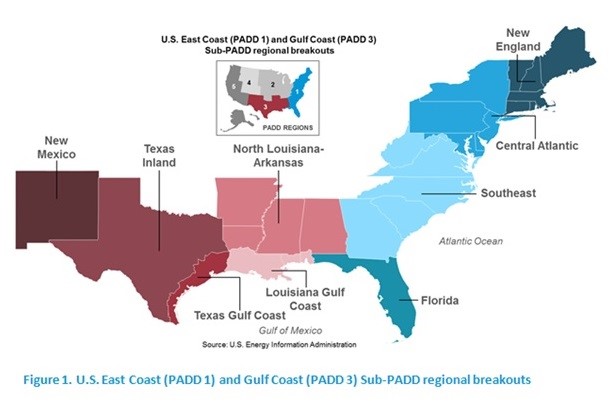
The Gulf Coast (PADD 3) is the largest domestic supplier of transportation fuels whereas the East Coast (PADD 1) is the largest transportation fuels consuming region in the country.
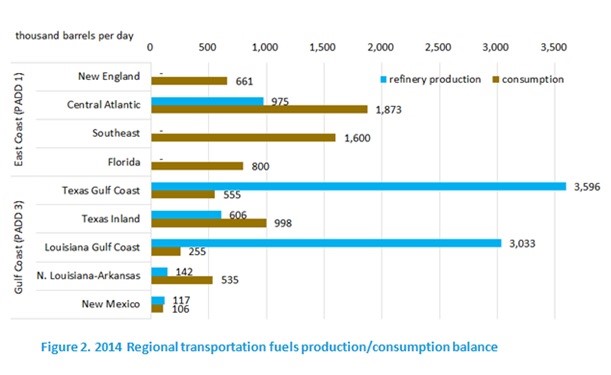
Pipeline infrastructure links the two PADDs- the East Coast & the Gulf Coast. Here the International trade play key roles in balancing the mismatch between supply and use of transportation fuels within each region.
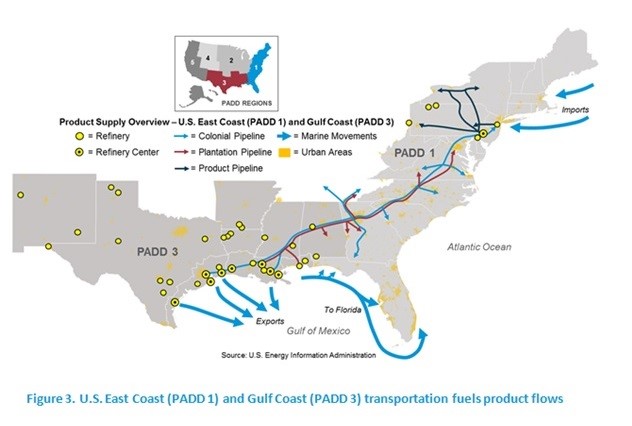
Top U.S Oil & Gas Companies:
|
Rank |
Oil & Gas Company |
Market Value in 2015(in billion USD) |
|
1 |
Exxon Mobil |
356.5 |
|
2 |
Chevron |
197.4 |
|
3 |
ConocoPhillips |
76.7 |
|
4 |
Occidental Petroleum |
56.3 |
|
5 |
EOG Resources |
50.3 |
|
6 |
Anadarko Petroleum |
42.7 |
|
7 |
Phillips 66 |
42.6 |
|
8 |
Valero Energy |
32.7 |
|
9 |
Marathon Petroleum |
28 |
|
10 |
Devon Energy |
24.8 |
Major Oil & Gas Companies around the Globe:
- China National Petroleum Corp
- Sinopec
- ExxonMobil
- Saudi Arabian Oil Company
- Kuwait Petroleum Corp
- Chevron Corporation
- OJSC Lukoil
- American Association of Petroleum Geologists
- Pennsylvania Petroleum Association
- Society of Petroleum Engineers
- Canadian Heavy Oil Association
- Canadian Institute of Mining, Metallurgy and Petroleum
- Canadian Society of Petroleum Geologists
- The Petroleum Marketers Association of America
- Japanese Association for Petroleum Technology
- Australian Institute of Petroleum
- Australian Petroleum Production and Exploration Association
Professional and Industry Associations in America:
- American Association of Drilling Engineers
- American Institute of Chemical Engineers
- Society of Petroleum Engineers
- American Association of Professional Landmen
- The Society of Petroleum Engineers (SPE)
- Council of Petroleum Accountants Societies
- American Association of Petroleum Geologists
Why to attend?
Petroleum Processing 2018 conference is your single best opportunities to reach the largest assemblage of participants from the global Oil and Gas industry. In this platform you can share knowledge, experience and information related to Petroleum & Industrial Chemistry. Its conduct workshops, distribute new information & statistics, meet with current and potential personalities, give a touch to a new product line, and receive name recognition at this 2-day event. World-renowned speakers, the most recent techniques, tactics, and the newest breakthroughs in the sector of Petroleum engineering are hallmarks of this conference.
Benefits:
- Meet Experts & Influencers Face to Face
- Networking Opportunities
- To present your work to others
- To learn new things in your field
- To learn new things outside of your field
- Access to incredible speakers
- New Tips & Tactics
- Educational opportunities
- The Energy of Like-Minded Individuals
- Encounter new vendors and suppliers
- Learning in a New Space
- To solicit business
Targeted audience:
- Petroleum refinery industries
- Petroleum engineering companies
- Oil and gas companies
- Chemical Colleges
- Petroleum Students, Engineers, Scientists
- Petroleum, Oil and Gas Researchers
- Petroleum and Chemistry Faculty
- Petroleum Associations and Societies
- Business Entrepreneurs
- Manufacturing Companies
- Training Institutes
- Oil and Gas Associations
- Petroleum Analysts
- Petroleum and Petrochemicals Marketers
- Geologists, Geophysicists, Reservoir engineers
Conferences are some of best times to meet and get inspired by scientists & inventors globally. Hope, you will also take the advantage of this conference and make the best out of it.
Thanks for attending Petrochemistry 2017!!
Another Petrochemistry and Chemical Engineering conference has been successfully completed- The 7th edition – and we must Thank the attendees, Holiday Inn Hotel & Suites Atlanta Airport-North & Conference Centre Staff, and the Organizing Committee, Ad-Sponsors & Media partners and everyone else that helped to make this 7th World Congress on
Petrochemistry and Chemical Engineering with the theme: A global hub for exchanging the advanced technologies in Petrochemistry a successful conference.
To Attendees,
We hope that you obtained the kind of advance technical information in the arena of Petroleum, Chemical Engineering that you were seeking, and that your role in the field has been enhanced via your participation. We hope that you were able to take part in all the sessions and take advantage of the tremendous advancements in Petrochemistry and Chemical Engineering that scientists are working with.
If you have any feedback for us for future consideration or enhancements of this Conference, please provide your feedback to Conference Manager.
Jessie Rose at petrochemistry@chemseries.com
The meeting covered various sessions, in which the discussions included the scientific tracks:
Petroleum Exploration & Field Management
Chemical Applications in Producing Oil and Gas
Production Technology and Separation Techniques
Chemical Reaction Engineering and its Applications
Process Chemistry & Technology
Reservoir Engineering
Health, Safety, and Environment
Renewable Energy and Feedstock
Coal and Natural Gas
Modeling and Simulation
Recent advances in Petrochemistry
Entrepreneurs Investment Meet
The Keynote presentations were given by:
Russell R Chianelli| University of Texas at El Paso| USA
Davis L. Ford | The University of Texas at Austin | USA
Joseph D Smith | Missouri University of Science and Technology | USA
Craig L Hill | Emory University | USA
Bookmark your dates: We hope to see you at Petroleum Processing 2018, Alabama, USA during November 09-10, 2018
Organizing Committee
Petrochemistry 2017
Conference Highlights
- Crude oil distillation & Excavation
- Hydrotreating and Hydrocracking
- Oil & Gas Management
- Offshore Technologies and Pipeline-Storage
- Biofuels & Biodiesel
- Nanotechnology in Oil and Gas Industry
- Petrochemistry
- Process Simulation & Process Design in chemical engg.
- Natural hazards in Petroleum industry
- Reservoir Engineering
- Sustainable Energy
- Geology and Environmental Sustainability
- Oceanography
- Marine Geology
To share your views and research, please click here to register for the Conference.
To Collaborate Scientific Professionals around the World
| Conference Date | November 09-10, 2018 | ||
| Sponsors & Exhibitors |
|
||
| Speaker Opportunity Closed | |||
| Poster Opportunity Closed | Click Here to View | ||
Useful Links
Special Issues
All accepted abstracts will be published in respective Our International Journals.
Abstracts will be provided with Digital Object Identifier by







